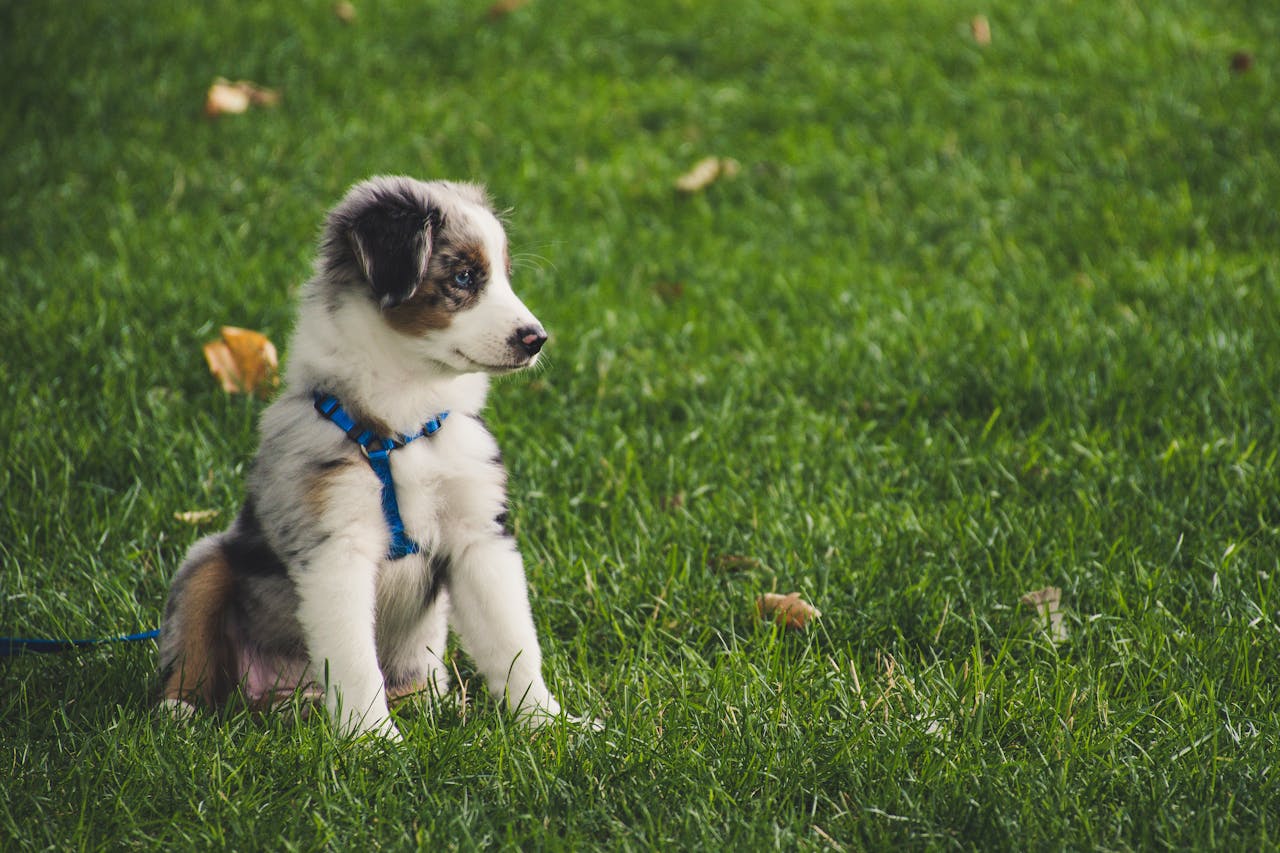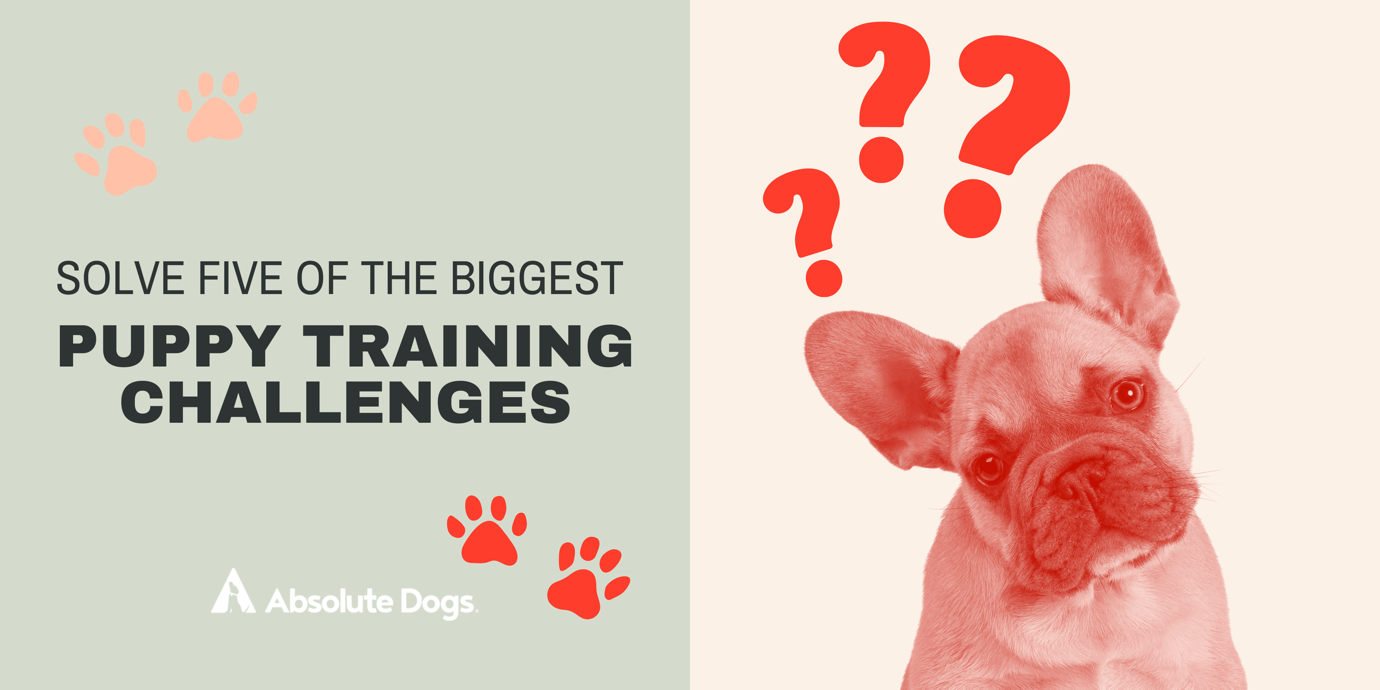Comments
- No comments found

Bringing a new puppy home is a joyous time.
It doesn’t get more exciting than beginning the next chapter of your life with a puppy who brings boundless energy and affection to your adventures. That said, welcoming a puppy to your household can come with challenges. Lauren Langman and the specialist trainers at Absolute Dogs want to make sure these struggles don’t take away from the thrill of welcoming a puppy to your life.

Here, they share five of the most common puppy challenges that owners face and tips on how to overcome these.
When you bring your puppy home, they might get on with your other dog(s) quickly. However, they might need a few days or even a few weeks to feel comfortable with your other dogs and vice versa.
When put together straight away, a puppy and another dog may feel threatened. While a puppy may find an adult dog intimidating, an adult dog may find a puppy boisterous and even annoying. This dynamic can lead to snapping, growling, and rough play.
The good news is that there are ways to gradually introduce your puppy to your other dogs and prevent negative behaviour between them. Here are three tips from Absolute Dogs to help.
Being immediately introduced to other dogs can prove overwhelming for a puppy. When you bring your puppy home, allow them to settle in and decompress away from any other dogs in your household.
Create an environment where your other dogs can’t access your puppy by installing a baby gate, x-pen, or crate. This way, you can separate your dogs while allowing them to hear, smell, and maybe even see each other.
By doing this, your other dogs can get used to the idea that a puppy has joined the family before getting to know each other properly. Meanwhile, your puppy will get used to the fact that there are other dogs in the house.
Once your puppy has settled in, walk them alongside your other dogs. A carefully planned walk can help your puppy and other dogs feel more comfortable together.
You’ll need one person per dog to try this strategy. Your dogs should be able to see each other as they walk in parallel, but they shouldn’t need to interact with each other. Let your dogs explore the environment as they walk, and reward them when they calmly observe each other.
As your puppy and your other dogs become more comfortable with each other, gradually decrease the distance between them. They don’t need to interact with each other until they’re ready.
Choosing a space where you’re unlikely to run into other people or dogs can be helpful when trying this exercise.
If you already have more than one other dog at home, helping your puppy become part of their group can be especially challenging. When your puppy is ready to interact with your other dogs, help them avoid overwhelm by introducing them one at a time.
You can do this by taking parallel walks with different dogs (rather than all at once). You can also invite individual dogs into your puppy’s gated area until your puppy is confident with each of the dogs in a one-to-one environment.
Training your puppy at home can be difficult if your other dogs want to also get in on the action! Absolute Dogs recommends three strategies to train your puppy when you have other dogs at home.
Your other dogs may struggle to stay calm when watching you train your puppy. They may not have enough self-control to relax while your puppy plays training games.
In fact, a dog watching a puppy train can be hard for them.. As a result, it can be helpful to train your puppy away from other dogs until these dogs have the self-control to stay calm during puppy training.
If any of your dogs are possessive or overexcited when it comes to food, keeping them separate during training is especially important. This way, you can avoid one dog worrying about another taking their food.
When you do expose your other dogs to your puppy’s training sessions, it’s essential to reward them for being calm in this situation. You may need to reward them even more than the puppy in training.
Play boundary games with your puppy and your other dogs to familiarise them with the concept of waiting their turn. Once each dog has become confident playing these games, they’ll likely respond better to you training them together.
When you start group boundary training, begin with your puppy and just one other dog. Generously reinforce your puppy while the other dog performs simple, easy behaviours. If you have other dogs, switch the dog doing the simple behaviours to help your puppy work around other dogs.
Rather than adopting a one-size-fits-all training approach, remember that each of your dogs has different needs. For example, while one may need more calmness training, another may need to play more boundary games.
Absolute Dogs reminds owners that “fair doesn’t always mean equal.” Your dogs will each need different training, enrichment, and exercise plans. So, don’t feel guilty about spending different amounts of time with them. Instead, focus on the quality of the time you spend with each dog.
As puppies are adorable, it’s easy to let them get away with certain behaviour — like jumping on guests — that you wouldn’t allow from an adult dog. However, your puppy will grow up. And if you’ve allowed this behaviour before, stopping it later can be much more difficult.
Here’s Absolute Dogs’ advice to set expectations around jumping on people from the get-go.
Curb jumping up behaviours by often rewarding your puppy for having all four paws on the ground. When a puppy doesn’t rehearse jumping, they’re unlikely to start jumping as they mature.
During training sessions, focus on calmness, self-control, managing excitement levels, and making good choices. As your puppy progresses, present them with opportunities to make good decisions using their developed skills.
Encourage your puppy to drag a line, or keep them on a lead, when other people are around. This way, your puppy will find it harder to jump at a person, and you can control the level of interaction that they engage in.
When guests insist on interacting with your puppy, politely let them know that your puppy is training and isn’t ready to say hello yet.
Practising calmness and socialisation can minimise a puppy’s tendency to jump on people. Cultivate calmness around the things and people you want your puppy to interact with. When you foster calmness, you can help your puppy manage controlled but confident interactions with other people and animals.
Many puppies are unsure about eating when they first come home. They may need some time to adjust before they get their appetite up. In this case, leaving food out can encourage them to continue acting finicky about eating. Instead, Absolute Dogs recommends Ditching the Bowl.
Rather than using a food bowl, Ditch the Bowl involves feeding your puppy their daily food rations as rewards during training games. Ditching the Bowl allows you to increase your puppy’s perceived value of food and add an extra element of fun to training.
Ditch the Bowl turns a reward into an experience. Puppies don’t just receive food as a reward. They play a game that makes the whole experience of receiving food rewarding.
For example, you could toss your puppy’s food so they can enjoy the excitement of chasing or catching it. Experiment to see what kinds of reward experiences your puppy likes best. Be generous and unpredictable to keep your puppy engaged and interested.
Patience is key when switching from mealtimes to Ditching the Bowl. Your puppy may need a few days to get excited about food rewards. Keep in mind that they may prefer to eat off the floor than from your hand to begin with. They may also find it difficult to track food, so keep food tosses in their line of sight.
Ditch the Bowl aside, you can also insert some of your puppy’s rations into food toys. These toys make for great mental enrichment and encourage your puppy to rehearse calm behaviour.
Research shows that canine enrichment feeding solutions like these have many benefits, from increasing interest in meals to improving mental stimulation.
Many puppies are fearful when they first move in with their owner(s). When they’re still progressing through their developmental stages, they may feel anxious or wary of new places, people, and situations.
Try these strategies from Absolute Dogs to help your puppy grow their confidence during this time.
Socialisation training involves showing your puppy how to recognise and interact with other dogs and animals to help them become more confident.
Start slow and build your puppy’s confidence gradually. If you push a puppy too far too quickly, they may take a step backwards rather than forwards. Watch your puppy to make sure they approach socialisation opportunities with curiosity rather than fear. Playing games that promote optimism can help take the pressure off and encourage quicker progression.
Join Absolute Dogs’ Games Club to follow socialisation training in a vault of over 300 videos.
Some puppies sit back and watch when they’re worried about interacting with something or someone. It’s easy to mistake this behaviour for confidence. In this case, your puppy may hide, tuck their tail in, move their ears back, widen their eyes, or curl a lip. These signs all show they may be uncomfortable with something or someone getting too close.
If your puppy isn’t obviously happy to engage, they’re probably not feeling confident. In this situation, allow them to take the lead. They may want to investigate by touching and smelling things or people who are interesting or confusing. This doesn’t mean they want to interact with the item or person — they just want more information.
Having this knowledge allows you to advocate for your puppy. Ask others not to stroke them, and to be patient while your puppy is still scoping them out. When your puppy happily seeks them out, this is the time for stroking and playing.
If you have a puppy in your life, or if you plan to welcome one soon, now is the time to plan how you’ll prevent and overcome training struggles.
Absolute Dogs has collated over 10 resources that show you how to transform your puppy’s behaviour. This bundle will make your puppy’s training smooth sailing right through to adulthood.
Download Absolute Dogs’ puppy resource bundle.
Absolute Dogs has made the lives of over 120,000 dog owners and handlers easier with its suite of reward-based dog behaviour courses, memberships, and other offers. As an Olympia and Crufts champion, popular dog training book author, and proven training expert, co-founder Lauren Langman brings a wealth of expertise to these offerings. From the Games Club to the Sexier Than a Squirrel Challenge and Naughty But Nice online course, Absolute Dogs offers a training solution for every dog owner.
Leave your comments
Post comment as a guest